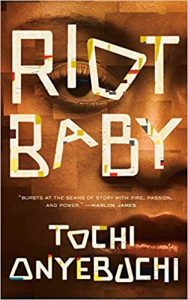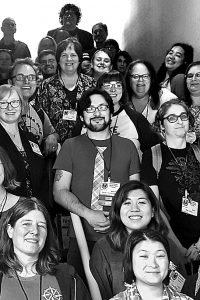Notes from a Year Spent Indoors…. by Jonathan Strahan

I started the year with good intentions. I intended to read every piece of short fiction that I could lay my hands on, every major novel, every exciting debut or anthology or short story collection and more. I would read all the things. This is the story of how I did not read all the things. I did not even read most of the things.
Way back in January, everything seemed simple. I hadn’t heard of a growing problem in China; I’d just delivered my Year’s Best SF anthology to the publisher and finished my part in Locus‘s year in review. I was ready for something new and exciting, and it fell into my hands. My pick for the best novella of the year, Tochi Onyebuchi’s blazing Riot Baby, was the first new fiction I read in 2020. It tells of a brother and sister with extraordinary powers, one in jail for the crime of being Black in America and the other left to visit him and to wait for him. Ella’s visits to Kev put the story of Black America in sharp relief and are no less powerful nearly a year later.
Also in January, a friend visited on their way from the Cocos Islands to Sydney and recommended a series of crime novels set in Belfast in the ’80s. That lead to me spending February reading my way through Adrian McKinty’s fabulous Sean Duffy books and then Don Winslow’s The Winter of Frankie Machine, all of which kept me fresh and reading as word from China became more worrisome. It was around now – mid-February – that I read one of my other favorite books of 2020, James Bradley’s troubling but tender novel, Ghost Species, which tells of climate catastrophe and pandemic and looks at what happens when we try to bring back one of our closest cousin species.
 I read a handful of other novellas, an Elton John bio, and two terrific novels in February, my best month for reading of the year. I kicked off with what ended up being one of the most celebrated novels of 2020, N.K. Jemisin’s The City We Became. The opening two thirds of The City We Became were a breath of fresh air, as Jemisin took the stuff of urban fantasy and turned it on its ear, personifying the heady, complex life of New York City and its five boroughs in a tale of discovery and survival. I wasn’t taken with where the story went, but I’ll still definitely be there for the next instalment. Then there was Kim Stanley Robinson’s towering The Ministry for the Future. It was published in October, but I got to read it in mid-February. It struck like a mallet hitting a gong, reverberating through the year. Told mostly from the perspectives of a young aid worker who survives a horrific tragedy in India and a middle-aged Irish bureaucrat running a UN body tasked with representing the rights of future generations in a time of eco-collapse, it’s terrifying, unrelenting, but ultimately hopeful. Robinson is the SF writer of my lifetime, and this stands as some of his best work. It’s my book of the year.
I read a handful of other novellas, an Elton John bio, and two terrific novels in February, my best month for reading of the year. I kicked off with what ended up being one of the most celebrated novels of 2020, N.K. Jemisin’s The City We Became. The opening two thirds of The City We Became were a breath of fresh air, as Jemisin took the stuff of urban fantasy and turned it on its ear, personifying the heady, complex life of New York City and its five boroughs in a tale of discovery and survival. I wasn’t taken with where the story went, but I’ll still definitely be there for the next instalment. Then there was Kim Stanley Robinson’s towering The Ministry for the Future. It was published in October, but I got to read it in mid-February. It struck like a mallet hitting a gong, reverberating through the year. Told mostly from the perspectives of a young aid worker who survives a horrific tragedy in India and a middle-aged Irish bureaucrat running a UN body tasked with representing the rights of future generations in a time of eco-collapse, it’s terrifying, unrelenting, but ultimately hopeful. Robinson is the SF writer of my lifetime, and this stands as some of his best work. It’s my book of the year.
March would be all about fantasy. I read two magnificent fantasy novels late in the month. Probably my favorite was Alix E. Harrow’s sophomore effort, The Once and Future Witches, in which three sisters in a fictionalized Salem look to restore magic to the world. Wild, angry, funny, tender, and deeply engaging, it’s a wonderful book that was a balm for the time. Immediately after Witches, I sat down with Garth Nix’s much politer-seeming The Left-Handed Booksellers of London, a caper novel that provided absolutely everything it promised on the cover and more. In mid-1980s London, Susan Arkshaw goes in search of her father and finds an old England filled with dark magic and one of the fighting booksellers who help keep it in line. A blend of Diana Wynne Jones and Robert Holdstock, it’s one of Nix’s best books and his best outside the Old Kingdom.
By then the year had definitely gone a bit pear-shaped. Gary K. Wolfe and I recorded 158 episodes of our Coode Street podcast, talking with people about what they were reading – it seems Martha Wells’s Murderbot Diaries and Hilary Mantel’s The Mirror and the Light were bringing most solace to readers in difficult times. In quick succession, I read Paul McAuley’s War for the Maps, a stunning SF novel and one of his best in years; Lavie Tidhar’s incendiary remapping of the Arthurian legend as a gang drama in By Force Alone; and my second-favorite book about witches for 2020, Liz Williams wonderful fantasy Comet Weather. In fact, for all that four of my picks for the best of 2020 are science fiction, it was an incredible year for fantasy. The Jemisin, Harrow, Tidhar, and Williams novels all stood out, but there was a lot of fantasy to love.
The unexpected gift of 2020 – and it was a year of unexpected gifts – was Susanna Clarke’s second novel, Piranesi. A Gormenghastian treat, it told of a man trapped in an endless house and the Other who visits twice a week. Utterly unlike Jonathan Strange and Mr Norrell, it was almost its equal. The other Gormenghastian tale was Alex Pheby’s Mordew, a dark, profligately imaginative tale of boy living in a sea-battered city and making things out of living mud. I’d not read Pheby’s work before, but will be following the story of Mordew eagerly. Then there was M. John Harrison’s brilliant, allusive, engaging, and strange The Sunken Land Begins to Rise Again, which was essential reading and completely its own thing. While there many books I loved this year, this one might be the one that lingers in my memory the longest. Some of my favorite fantasies of 2019 also had sequels in 2020. Joe Abercombie’s A Little Hatred, which took his First Law world into an industrial revolution, knocked my socks off, and sequel, The Trouble with Peace, was every bit as good and the highlight of my mid-year reading. I can’t wait for the series’s closer. I also enjoyed Tamsyn Muir’s sophomore effort, Harrow the Ninth; Rebecca Roanhorse’s series opener Black Sun, and Elizabeth Hand’s The Book of Banners and Lamps.
While the rest of the world was locked-down, by mid-year Western Australia was simply locked-in (our borders were closed and COVID was mostly something seen from afar), and my reading began to slow down. I did catch up with the latest from William Gibson, Agency, which had everything we expect from a post-Sprawl Gibson novel, and, along with Cory Doctorow’s Attack Surface, was one of two major books published during the year about living in the communications world we find ourselves in, the former slick and smooth, the latter angry and revolutionary. I then read Elizabeth Bear’s second White Space novel, Machine, which I liked even more than I did Ancestral Night, Alastair Reynolds’s series closer Bone Silence; and Kate Eliot’s sweeping space opera Unconquerable Sun. I also read a trio of books from India: Samit Basu’s near future anti-Dystopian tale of India and AI, Chosen Spirits, strongly recommended; Ghautam Batia’s powerful dystopian debut, The Wall; and Lavanya Lakshminarayan’s stunning debut story cycle/collection/novel, Analog/ Virtual: And Other Simulations of Your Future, which marked the arrival of a major talent – an essential book of the year.
In amongst everything I also read a handful of promising debuts. Darcie Little Badger’s Elatsoe, Simon Jimenez’s The Vanished Birds, and Micaiah Johnson’s The Space Between Worlds are all really worth reading and recommended. The Jiminez in particular marks the arrival of a major talent. In August, I did some catch-up reading and fell in love with Arkady Martine’s A Memory Called Empire, the best C.J. Cherryh space opera not actually written by C.J. Cherryh, and then got a sneak look at sequel A Desolation Called Peace, which was even better, but now leaves me waiting ages for Martine’s next book.
I’ve mentioned unexpected gifts several times, and nothing better meets that description than Robert Shearman’s overwhelming short story collection, We All Hear Stories in the Dark. Across three volumes, with more than a hundred stories, Shearman gives us something that’s part Scheherazade, part choose-your-own-adventure, as a man is told that he can see his dead wife once more, only if he reads the stories here in the right order, whatever that might be. Funny, whimsical at times, scary at others, and heart-warming – it’s a treasure-trove of story unlike anything else I’ve seen.
 The last few months of 2020 are a bit of a blur, and by this time I was reading desperately to catch up. P. Djèlí Clark’s remarkable, angry novella Ring Shout stands as the 2020 bookend to Tochi Onyebuchi’s Riot Baby, two tales of Black America that were powerful, overwhelming, essential, and necessary. I read almost no horror fiction in 2020, but Stephen Graham Jones’s extraordinary The Only Good Indians is easily the best horror novel I’ve read in years, while Quan Barry’s charming fantasy of witches, field hockey, and the end of the ’80s, We Ride Upon Sticks, was my favorite young-adult title of the year and another great witch story.
The last few months of 2020 are a bit of a blur, and by this time I was reading desperately to catch up. P. Djèlí Clark’s remarkable, angry novella Ring Shout stands as the 2020 bookend to Tochi Onyebuchi’s Riot Baby, two tales of Black America that were powerful, overwhelming, essential, and necessary. I read almost no horror fiction in 2020, but Stephen Graham Jones’s extraordinary The Only Good Indians is easily the best horror novel I’ve read in years, while Quan Barry’s charming fantasy of witches, field hockey, and the end of the ’80s, We Ride Upon Sticks, was my favorite young-adult title of the year and another great witch story.
I acquired novellas and short fiction for Tordotcom, and edited three anthologies during 2020, so recognizing conflicts of interest, I’ll limit my comments on short fiction to a few books that I felt stood out. Meg Elison’s Big Girl was a complete surprise to me, as was Lavanya Lakshminarayan’s Analog/ Virtual. Other collections that stood out in a strong year included The Best of Jeffrey Ford, M. John Harrison’s Settling the World: Selected Stories 1970-2020, Ken Liu’s The Hidden Girl and Other Stories, and Angela Slatter’s The Heart is a Mirror for Sinners & Other Stories.
It was also an interesting year in anthologies, with a number of diverse books published. Ann VanderMeer’s latest xPrize anthology, Avatars Inc, was one of the best science fiction anthologies of the year, along with Sheila Williams’s Entanglements, both examples of think-tank type projects that broke the mould and featured great stories. I was also impressed by Dominion: An Anthology of Speculative Fiction from Africa and the African Diaspora, Wole Talabi’s Africanfuturism: An Anthology, Ge Yan’s That We May Live: Speculative Chinese Fiction, William Schafer’s outstanding Subterranean: Tales of Dark Fantasy 3, and not one but two Decameron projects, one from Jo Walton published online via Patreon and one from the New York Times. I also thought Ian Whates’s London Centric: Tales of Future London was excellent.
That’s about it. A year of reading, dominated by tales of climate change, witchcraft, and an increasingly diverse choir of international voices – all of which are welcome. It’s hard not to sit, with the New Year having just been rung in, and be concerned for book publishing and how stories will reach readers in 2021 and beyond, but for now I’m just grateful for the stories I read during the year. I trust you’ll enjoy them too.
This review and more like it in the February 2021 issue of Locus.
 While you are here, please take a moment to support Locus with a one-time or recurring donation. We rely on reader donations to keep the magazine and site going, and would like to keep the site paywall free, but WE NEED YOUR FINANCIAL SUPPORT to continue quality coverage of the science fiction and fantasy field.
While you are here, please take a moment to support Locus with a one-time or recurring donation. We rely on reader donations to keep the magazine and site going, and would like to keep the site paywall free, but WE NEED YOUR FINANCIAL SUPPORT to continue quality coverage of the science fiction and fantasy field.
©Locus Magazine. Copyrighted material may not be republished without permission of LSFF.







